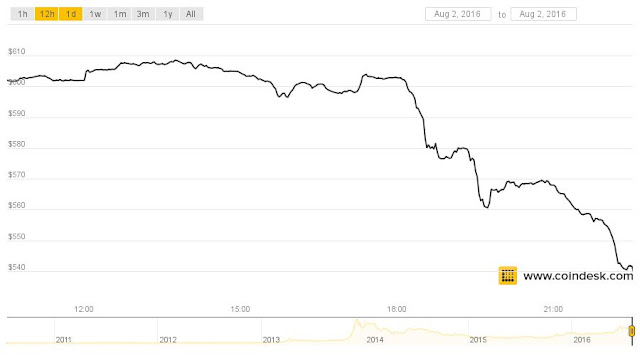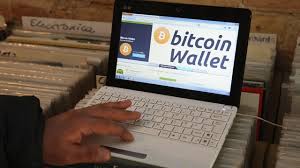Securing the bitcoin trading platform has proved elusive.
 The price of bitcoin fell sharply today exacerbating an already ongoing decline as global market participants reacted to news that one of the largest digital currency exchanges had been hacked. Bitcoin Drops Nearly 20% as Exchange Hack Amplifies Price Decline
The price of bitcoin fell sharply today exacerbating an already ongoing decline as global market participants reacted to news that one of the largest digital currency exchanges had been hacked. Bitcoin Drops Nearly 20% as Exchange Hack Amplifies Price Decline

The price of the virtual currency bitcoin fell sharply after Hong Kong-based digital-currency exchange Bitfinex said it was hacked, resulting in the possible theft of about $65 million worth of bitcoin.
News of the Bitfinex hack hit the price of bitcoin hard in heavy trading on Tuesday. It fell to $540 by late in the day, down about 12% from its level near $613 early Tuesday, according to CoinDesk. At one point, it traded as low as $480, down about 22%, though it recovered to about $548 by late morning in New York on Wednesday.
The hack marks one of the largest thefts in bitcoin’s short history and follows a separate alleged theft of an estimated $60 million worth of ethereum, a rival virtual currency, in June. In 2014, investor confidence in bitcoin also was dented by another larger cybersecurity breach, at the Japanese exchange Mt. Gox.
Hacking and thefts of investor property stand as two of the biggest issues that may prevent the fast-growing digital currency from gaining more widespread use. Bitcoin trades on an open ledger known as the blockchain that has excited technologists for its ability to cut out expensive layers of bureaucracy in various areas of commerce.
But securing the bitcoin trading platform has proved elusive. Tuesday, Bitfinex acknowledged the latest theft in a statement on its website and said it was halting all trading on Bitfinex as well as the deposits and withdrawals of digital tokens.
“The theft is being reported to—and we are co-operating with—law enforcement,” the statement said. “We are deeply concerned about this issue and we are committing every resource to try to resolve it.”
Zane Tackett, Bitfinex’s director of community and product development, confirmed that 119,756 bitcoins were stolen and said the company knows “exactly how relevant systems were compromised.” At Tuesday’s value, the amount of bitcoin stolen was worth about $65 million. Mr. Tackett said the company is working with law enforcement and analytics companies to try to track down the stolen coins and is working to get its platform back up so customers can check their accounts.
It wasn’t clear what percentage of Bitfinex’s overall assets were stolen or whether or not the company had adequate insurance to cover the theft.
“We are investigating the breach to determine what happened, but we know that some of our users have had their bitcoins stolen,” the statement added. “We are undertaking a review to determine which users have been affected by the breach. While we conduct this initial investigation and secure our environment, bitfinex.com will be taken down and the maintenance page will be left up.”
In 2014, the Tokyo-based exchange Mt. Gox collapsed after a yearslong series of attacks resulted in the theft of about 850,000 bitcoins, at the time worth about $450 million. About 200,000 were later recovered. In June, Mt. Gox Chief Executive Mark Karpales was released from a Japanese prison on bail, after serving 10 months. The company’s liquidation is ongoing.
Bitcoin rallied earlier this year but had been selling off lately after an anticipated event known as a “halving” in early July lowered the subsidy paid to bitcoin miners supporting the network.
In 2015, Bitfinex switched to a system protected by what is known as “multiple signature” security, a feature that requires multiple “keys” to access bitcoin in a virtual wallet, and keeps the customers’ money in separate accounts, rather than pooling them into one larger account.
The exchange was fined $75,000 by the U.S. Commodity Futures Trading Commission in June for offering illegal off-exchange commodity transactions financed in bitcoin and other cryptocurrencies and for failing to register as a futures commission merchant. The CFTC said at the time that Bitfinex cooperated with its investigation and voluntarily made changes to its business practices to comply with regulations.
- The Wall Street Journal BY PAUL VIGNA AND GREGOR STUART HUNTER
Bitcoin worth US$72 mil stolen from Bitfinex exchange in Hong Kong
 A Bitcoin (virtual currency) paper wallet with QR codes and a coin are seen in an illustration picture taken at La Maison du Bitcoin in Paris, France, May 27, 2015.
Reuters/Benoit Tessier/File Photo
A Bitcoin (virtual currency) paper wallet with QR codes and a coin are seen in an illustration picture taken at La Maison du Bitcoin in Paris, France, May 27, 2015.
Reuters/Benoit Tessier/File Photo
HONG KONG (Aug 3): Nearly 120,000 units of digital currency bitcoin worth about US$72 million was stolen from the exchange platform Bitfinex in Hong Kong, rattling the global bitcoin community in the second-biggest security breach ever of such an exchange.
Bitfinex is the world's largest dollar-based exchange for bitcoin, and is known in the digital currency community for having deep liquidity in the US dollar/bitcoin currency pair.
Zane Tackett, Director of Community & Product Development for Bitfinex, told Reuters on Wednesday that 119,756 bitcoin had been stolen from users' accounts and that the exchange had not yet decided how to address customer losses.
"The bitcoin was stolen from users' segregated wallets," he said.
The company said it had reported the theft to law enforcement and was cooperating with top blockchain analytic companies to track the stolen coins.
Last year, Bitfinex announced a tie-up with Palo Alto-based BitGo, which uses multiple-signature security to store user deposits online, allowing for faster withdrawals.
"Our investigation has found no evidence of a breach to any BitGo servers," BitGo said in a Tweet.
"With users' funds secured using multi-signature technology in partnership with BitGo, a lot more is at stake for the backbone of the bitcoin industry, with its stalwarts and prided tech under fire," said Charles Hayter, chief executive and founder of digital currency website CryptoCompare.
The security breach comes two months after Bitfinex was ordered to pay a US$75,000 fine by the US Commodity and Futures Trading Commission in part for offering illegal off-exchange financed commodity transactions in bitcoin and other digital currencies.
BITCOIN SLUMP
Tuesday's breach triggered a slump in bitcoin prices and was reminiscent of events that led to the 2014 collapse of Tokyo-based exchange Mt Gox, which said it had lost about US$500 million worth of customers' Bitcoins in a hacking attack.
Bitcoin plunged just over 23% on Tuesday after the news broke. On Wednesday it was up 1% at US$545.20 on the BitStamp platform.
Tackett added that the breach did not "expose any weaknesses in the security of a blockchain", the technology that generates and processes bitcoin, a web-based "cryptocurrency" that can move across the globe anonymously without the need for a central authority.
A bitcoin expert said the scandal highlighted the risks of companies using cryptography for their ledgers.
"The more you rely on its benefits, the greater the potential for damage when keys are stolen. We still have some way to go to create highly secure but convenient systems," said Singapore-based Antony Lewis.
The volume of bitcoin stolen amounts to about 0.75% of all bitcoin in circulation.
It is not yet clear whether the theft was an inside job or whether hackers were able to gain access to the system externally. On an online forum, Bitfinex's Tackett said he was "nearly 100% certain" it was no one in the company.
Bitfinex suspended trading on Tuesday after it discovered the breach. It said on its website that it was investigating and cooperating with the authorities.
The security breach is the latest scandal to hit Hong Kong's bitcoin market after MyCoin became embroiled in a scam last year that media estimated could have duped investors of up to US$387 million. The bitcoin trading company closed after the scandal.
The president of the Hong Kong Bitcoin Association said the only way to protect information is to disperse it in so many small pieces that the reward for hacking is too small.
"For an attacker, the cost-benefit strategy is quite easy: How much is in the pot and how likely is it that I'm getting the pot?" said Leonhard Weese.
The attack on Bitfinex was reminiscent of a similar breach at Mt. Gox, a
Tokyo-based bitcoin exchange forced to file for bankruptcy in early
2014 after hackers stole an estimated $650 million worth of customer
bitcoins. - Reuters
Related posts:

Aug 25, 2015 ... Tokyo (AFP) - The arrest of MtGox boss Mark Karpeles has begun to shed light
on the defunct Bitcoin exchange after hundreds of millions of ...

Jun 27, 2016 ... Despite the increase in the price of bitcoin amid the UK's recent EU referendum,
a new research note from Needham & Company asserts it ...
Mar 30, 2014 ... It seemed ludicrous that the man credited with inventing Bitcoin - the world's most
wildly successful digital currency, with transactions of nearly ...

Apr 14, 2014 ... The Internet has spawned a new form of currency that's purely digital called
Bitcoin. Picture this — a high speed car chase with a slew of ...
 Ringgit is Asia's strongest currency
Ringgit is Asia's strongest currency






 Winners and losers in the global economy of 2025
Winners and losers in the global economy of 2025 
 Volatile proposition: bitcoin has plunged from its 2013 peak
Volatile proposition: bitcoin has plunged from its 2013 peak






